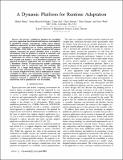| dc.contributor.author | Pham, Hubert | |
| dc.contributor.author | Paluska, Justin Mazzola | |
| dc.contributor.author | Saif, Umar | |
| dc.contributor.author | Stawarz, Christopher | |
| dc.contributor.author | Terman, Christopher J. | |
| dc.contributor.author | Ward, Stephen A. | |
| dc.date.accessioned | 2011-04-01T19:02:29Z | |
| dc.date.available | 2011-04-01T19:02:29Z | |
| dc.date.issued | 2009-05 | |
| dc.date.submitted | 2009-03 | |
| dc.identifier.isbn | 978-1-4244-3304-9 | |
| dc.identifier.uri | http://hdl.handle.net/1721.1/62019 | |
| dc.description.abstract | We present a middleware platform for assembling pervasive applications that demand fault-tolerance and adaptivity in distributed, dynamic environments. Unlike typical adaptive middleware approaches, in which sophisticated component model semantics are embedded into an existing, underlying platform (e.g., CORBA, COM, EJB), we propose a platform that imposes minimal constraints for greater flexibility. Such a tradeoff is advantageous when the platform is targeted by automatic code generators that inherently enforce correctness by construction. Applications are written as simple, single-threaded programs that assemble and monitor a set of distributed components. The approach decomposes applications into two distinct layers: (1) a distributed network of interconnected modules performing computations, and (2) constructor logic that assembles that network via a simple block-diagram construction API. The constructor logic subsequently monitors the configured system via a stream of high-level events, such as notifications of resource availability or failures, and consequently provides a convenient, centralized location for reconfiguration and debugging. The component network is optimized for performance, while the construction API is optimized for ease of assembly. | en_US |
| dc.language.iso | en_US | |
| dc.publisher | Institute of Electrical and Electronics Engineers | en_US |
| dc.relation.isversionof | http://dx.doi.org/10.1109/PERCOM.2009.4912746 | en_US |
| dc.rights | Article is made available in accordance with the publisher's policy and may be subject to US copyright law. Please refer to the publisher's site for terms of use. | en_US |
| dc.source | IEEE | en_US |
| dc.title | A Dynamic Platform for Runtime Adaptation | en_US |
| dc.type | Article | en_US |
| dc.identifier.citation | Pham, H. et al. “A dynamic platform for runtime adaptation.” Pervasive Computing and Communications, 2009. PerCom 2009. IEEE International Conference on. 2009. 1-10. © Copyright 2010 IEEE | en_US |
| dc.contributor.department | Massachusetts Institute of Technology. Computer Science and Artificial Intelligence Laboratory | en_US |
| dc.contributor.department | Massachusetts Institute of Technology. Department of Electrical Engineering and Computer Science | en_US |
| dc.contributor.approver | Ward, Stephen A. | |
| dc.contributor.mitauthor | Pham, Hubert | |
| dc.contributor.mitauthor | Paluska, Justin Mazzola | |
| dc.contributor.mitauthor | Stawarz, Christopher | |
| dc.contributor.mitauthor | Terman, Christopher J. | |
| dc.contributor.mitauthor | Ward, Stephen A. | |
| dc.relation.journal | Proceedings of the IEEE International Conference on Pervasive Computing and Communications 2009 | en_US |
| dc.eprint.version | Final published version | en_US |
| dc.type.uri | http://purl.org/eprint/type/ConferencePaper | en_US |
| dspace.orderedauthors | Pham, Hubert; Paluska, Justin Mazzola; Saif, Umar; Stawarz, Chris; Terman, Chris; Ward, Steve | en |
| dc.identifier.orcid | https://orcid.org/0000-0002-9255-307X | |
| mit.license | PUBLISHER_POLICY | en_US |
| mit.metadata.status | Complete | |
